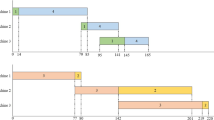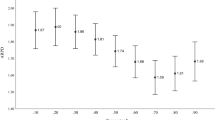Abstract
This paper aims at minimizing total tardiness in a no-idle permutational flow shop environment. Even though this criterion is relevant for improving client satisfaction in production systems with strict due dates, no constructive heuristics have been developed for this specific problem so far. In this study, high performance constructive heuristics from related problems were adapted and compared to a new one proposed for the problem \({F_m}\left| {no - idle,prmu} \right|\mathop \sum{T}\). Computational experiments show that the new method significantly outperforms the adapted existing heuristics.

Similar content being viewed by others
References
Adiri I, Pohoryles D (1982) Flowshop no-idle or no-wait scheduling to minimize the sum of completion times. Nav Res Logist 29:495–504
Baptiste P, Hguny L-K (1997) A branch and bound algorithm for the F/no − idle/Cmax. In: Proceedings of the international conference on industrial engineering and production management (IEPM97), Lyon, France, pp 429–438
Baraz D, Mosheiov G (2008) A note on a greedy heuristic for flow-shop makespan minimization with no machine idle-time. Eur J Oper Res 184:810–813
Cepek O, Okada M, Vlach M (2000) Note: on the two-machine no-idle flowshop problem. Nav Res Logist 47:353–358
Fernandez-Viagas V, Framinan JM (2015) NEH-based heuristics for the permutation fowshop scheduling problem to minimise total tardiness. Comput Oper Res 60:27–36
Graham R-L, Lawler E-L, Lenstra J-K, Kan A-R (1979) Optimization and approximation in deterministic sequencing and scheduling: a survey. Ann Discret Math 5:287–326
Johnson SM (1954) Optimal two and three-stage production schedules with set-up times included. Nav Res Logist Q 1(1):61–68
Kalczynski PJ, Kamburowski J (2007) On no-wait and no-idle flow shops with makespan criterion. Eur J Oper Res 178(3):677–685
Kalczynski P-J, Kamburowski J (2005) A heuristic for minimizing the makespan in no-idle permutation flowshop. Comput Ind Eng 49(1):146–154
Kim YD, Kim JG, Choi B, Kim HU (2001) Production scheduling in a semiconductor wafer fabrication facility producing multiple product types with distinct due dates. IEEE Trans Robot Autom 17(5):589–598
Kim Y-D (1993) Heuristics for flowshop scheduling problems minimizing mean tardiness. J Oper Res Soc 44(1):19–28
Liu J, Reeves C (2001) Constructive and composite heuristic solutions to the P || scheduling problem. Eur J Oper Res 132:439–452
Moccellin JV, Nagano MS (1998) Evaluating the performance of tabu search procedures for flow shop sequencing. J Oper Res Soc 49(12):1296–1302
Nagano MS, Moccellin JV (2002) A high quality solution constructive heuristic for flow shop sequencing. J Oper Res Soc 53(12):1374–1379
Nagano MS, Januário JCSS (2013) Evolutionary heuristic for makespan minimization in no-idle flow shop production systems. Acta Sci Technol 35(2):271–278
Narain L, Bagga P-C (2005) Flowshop/no-idle scheduling to minimise the mean flowtime. Anziam J 47:265–275.
Nawaz IHM, Enscore EE, Ham I (1983) A heuristic algorithm for the m-machine, n-job flow-shop sequencing problem. Omega 11(1):91–95
Pan Q, Ruiz R (2014) An effective iterated greedy algorithm for the mixed no-idle permutation flowshop scheduling problem. Omega 44:41–50
Panwalkar S, Dudek R, Smith M (1973) Sequencing research and the industrial problem. In: Symposium on the theory of scheduling. Springer, Berlin
Pinedo M (2008) Scheduling theory, algorithms, and systems, 3rd edn. Springer, New York
Rad S-F, Ruiz R, Boroojerdian N (2009) New high performing heuristics for minimizing makespan in permutation flowshops. OMEGA Int J Manag Sci 37:331–345
Raman N (1995) Minimum tardiness scheduling in flow shops: Construction and evaluation of alternative solution approaches. J Oper Manag 12(2):131–151
Rossi FL, Nagano MS, Tavares Neto RF (2016) Evaluation of high performance constructive heuristics for the flow shop with makespan minimization. Int J Adv Manuf Technol 87(1–4):125–136
Rossi FL, Nagano MS, Sagawa JK (2017) An effective constructive heuristic for permutation flow shop scheduling problem with total flow time criterion. Int J Adv Manuf Technol 90(1–4):93–107
Ruiz R, Vallada E, Fernandez-Martinez C (2009) Scheduling in flowshops with no-idle machines. Computational intelligence in flowshop and job shop scheduling. Springer-Verlag, Berlin, pp 21–51
Saadani N, Guinet A, Moalla M (2003) Three stage no-idle flow-shops. Comput Ind Eng 44(3):425–434
Sen T, Gupta S (1984). A state-of-art survey of static scheduling research involving due dates. Omega 12(1):63–76
Tasgetiren M-F, Pan Q, Suganthan P-N, Oner A (2013) A discrete artificial bee colony algorithm for the no-idle permutation flowshop scheduling problem with the total tardiness criterion. Appl Math Modell 37:6758–6779
Vachajitpan P (1982) Job sequencing with continuous machine operation. Comput Ind Eng 6(3):255–259
Vallada E, Ruiz R, Minella G (2008) Minimising total tardiness in the m-machine flowshop problem: a review and evaluation of heuristics and metaheuristics. Comput Oper Res 35(4):1350–1373
Woollam CR (1986) Flowshop with no idle machine time allowed. Comput Ind Eng 10(1):69–76
Acknowledgements
This research has been economically supported by Conselho Nacional de Desenvolvimento Científico e Tecnológico (CNPq) through the number process 448161/2014-1 and 308047/2014-1.
Author information
Authors and Affiliations
Corresponding author
Rights and permissions
About this article
Cite this article
Nagano, M.S., Rossi, F.L. & Tomazella, C.P. A new efficient heuristic method for minimizing the total tardiness in a no-idle permutation flow shop. Prod. Eng. Res. Devel. 11, 523–529 (2017). https://doi.org/10.1007/s11740-017-0747-2
Received:
Accepted:
Published:
Issue Date:
DOI: https://doi.org/10.1007/s11740-017-0747-2




